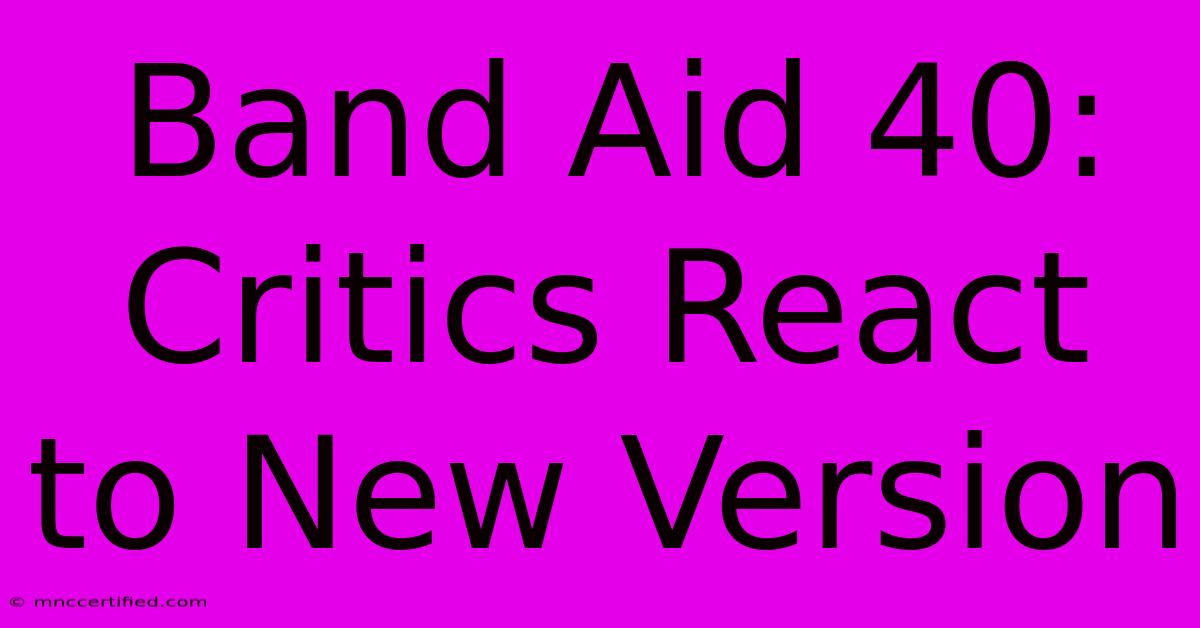Band Aid 40: Critics React To New Version

Table of Contents
Band Aid 40: Critics React to a New Generation's Take on a Classic
Band Aid's "Do They Know It's Christmas?" has been a staple of the holiday season for decades. Its initial release in 1984, spearheaded by Bob Geldof and Midge Ure, raised millions for famine relief in Ethiopia and became a cultural touchstone. Now, forty years later, a new version featuring a diverse array of contemporary artists has dropped, sparking considerable debate and varied reactions amongst critics. This article delves into the critical reception of Band Aid 40, analyzing both praise and criticism leveled at this ambitious reimagining.
A Fresh Coat of Paint or a Missed Opportunity?
The release of Band Aid 40 was met with a mixture of excitement and apprehension. The original's legacy is immense, casting a long shadow over any attempt at a revival. Some critics lauded the effort to modernize the song and its message, praising the inclusion of artists from diverse backgrounds reflecting a globalized world. The updated sound, incorporating contemporary production techniques, was also noted as a positive shift by some. The emphasis on raising awareness for contemporary global crises, rather than solely focusing on the Ethiopian famine, was seen by many as a necessary and progressive update.
Praise for Inclusivity and Modern Production
Many reviewers celebrated the move towards greater inclusivity in the artist lineup. The original Band Aid was criticized for its lack of diversity, a shortcoming the new version actively sought to address. This deliberate effort to broaden representation was widely praised as a step in the right direction, reflecting the changing musical landscape and societal values. The updated production, described by some as "fresh" and "energetic," was also applauded for injecting new life into a familiar song. This modernized approach avoided a mere replication of the original, which critics felt would have been a missed opportunity.
Criticism: A Lack of Authenticity and Questionable Relevance
However, not all reviews were positive. Several critics argued that the new version lacked the raw emotion and authenticity of the original. The original recording, made under intense pressure with artists donating their time and talent, carried a palpable urgency that some felt was missing in the 2023 iteration. Some argued that the polished production, while technically impressive, stripped away some of the rawness and emotional impact that made the original so powerful.
Concerns about Modern Relevance and Impact
A key point of contention was the song's relevance in a drastically different global landscape. While the aim of raising awareness for current crises is laudable, some critics questioned whether a re-recording of "Do They Know It's Christmas?" was the most effective approach. The song's lyrics, while updated, still felt somewhat dated to some, raising questions about their resonance with a younger generation. Concerns were raised about whether the updated version could achieve the same impact and fundraising success as its predecessor.
The Verdict: A Necessary Evolution or a Nostalgic Misfire?
Ultimately, the critical reception of Band Aid 40 is mixed. While the attempt to modernize the song and expand its inclusivity is commendable, some feel that the new version falls short of capturing the spirit and impact of the original. The success of Band Aid 40 won't be judged solely on critical reviews but also on its fundraising success and its capacity to engage a new generation in the fight against global poverty and inequality. Whether it succeeds in achieving this remains to be seen. The conversation around Band Aid 40 highlights the complexities of reinterpreting iconic works, the constant evolution of social consciousness, and the enduring challenge of addressing global humanitarian issues.
Keywords: Band Aid 40, Do They Know It's Christmas?, Bob Geldof, Midge Ure, music review, critical reception, modernization, inclusivity, global poverty, charity single, re-recording, cultural impact, social commentary, music industry.

Thank you for visiting our website wich cover about Band Aid 40: Critics React To New Version. We hope the information provided has been useful to you. Feel free to contact us if you have any questions or need further assistance. See you next time and dont miss to bookmark.
Featured Posts
-
Estrella Insurance Las Vegas Nv
Nov 26, 2024
-
Tonights Celtics Vs Clippers Game
Nov 26, 2024
-
Watch Newcastle Vs West Ham Live Stream Info
Nov 26, 2024
-
Ramsey Case Directors Conviction
Nov 26, 2024
-
Judge Rules Against Trump On 2020 Election
Nov 26, 2024